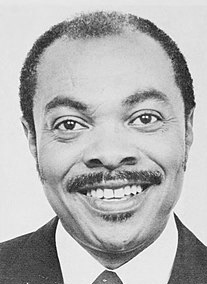Bill Owens (Massachusetts politician) facts for kids
Quick facts for kids
Bill Owens
|
|
|---|---|

Bill Owens, 1991
|
|
| Member of the Massachusetts House of Representatives from the 10th Suffolk district |
|
| In office 1973–1975 |
|
| Preceded by | I. Edward Serlin |
| Succeeded by | Mary H. Goode |
| Member of the Massachusetts Senate from the Second Suffolk district |
|
| In office 1975–1983 |
|
| Preceded by | Michael LoPresti Jr. |
| Succeeded by | Royal L. Bolling |
| In office 1989–1993 |
|
| Preceded by | Royal L. Bolling |
| Succeeded by | Dianne Wilkerson |
| Personal details | |
| Born | July 6, 1937 Demopolis, Alabama |
| Died | January 22, 2022 (aged 84) Boston, Massachusetts |
| Political party | Democratic |
| Children | 6 |
| Alma mater | Boston University UMass Amherst |
William "Bill" Owens (July 6, 1937 – January 22, 2022) was an important American politician and a successful businessman. He made history as the first Black state senator in the Massachusetts State Senate. This means he was the first African American to be elected to the higher house of the state's lawmaking body.
Contents
About Bill Owens
Bill Owens was born in Demopolis, Alabama, on July 6, 1937. He moved to Boston and attended the English High School of Boston. Later, he studied at several universities, including Boston University, Harvard University, and University of Massachusetts Amherst. He worked as a private consultant and lived in Mattapan, a neighborhood in Boston, Massachusetts.
His Time in Politics
Bill Owens began his political career in the Massachusetts House of Representatives. He served there from 1973 to 1975 as a member of the Democratic Party.
After a new state senate seat was created for a mostly Black area in South Boston, Bill Owens decided to run for it. He won the election, defeating Royal L. Bolling. He then served in the Massachusetts Senate from 1974 to 1982.
Changing Political Parties
In the early 1980s, Bill Owens changed his political party to Republican. He felt that the State Senate was too strict. He also believed the Democratic Party was moving too slowly on important issues like racial justice and making the economy fair for everyone.
After losing his re-election as a Republican to Royal L. Bolling, he switched back to the Democratic Party. He ran against Bolling one last time and won. He then served another term in the state senate from 1989 to 1993. He lost the 1992 Democratic primary election to his successor, Dianne Wilkerson.
What Bill Owens Achieved
As a lawmaker, Bill Owens worked hard to create new programs. He helped start the Massachusetts state Office of Minority Business Assistance. This office helps businesses owned by people from minority groups. He also helped create the Summer Youth Jobs Program, which gives young people jobs during the summer.
Bill Owens also supported laws that control guns. In the 1980s, he even suggested a bill that would have required the state government to pay money to descendants of enslaved Black Americans in Massachusetts. This was a way to make up for the past injustices of slavery.
His sister, Shirley Owens-Hicks, also became a politician. She served in the Massachusetts House of Representatives from 1987 to 2006.
His Later Years
Bill Owens passed away on January 22, 2022, at the age of 84. He died in his sleep at a nursing facility in Brighton, Boston. This was about three weeks after he had tested positive for COVID-19.

